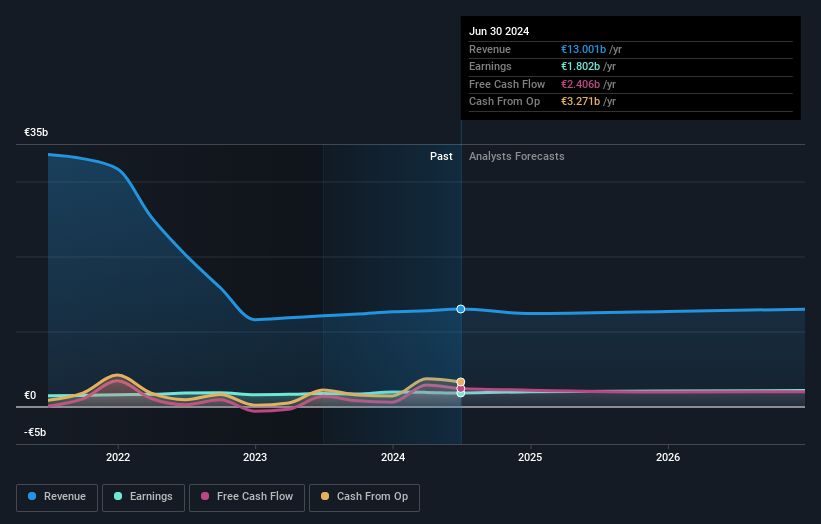Poste Italiane S.p.A.'s (BIT:PST) largest shareholders are private companies who were rewarded as market cap surged €647m last week

Key Insights
- Significant control over Poste Italiane by private companies implies that the general public has more power to influence management and governance-related decisions
- The top 2 shareholders own 65% of the company
- Institutional ownership in Poste Italiane is 11%
If you want to know who really controls Poste Italiane S.p.A. (BIT:PST), then you'll have to look at the makeup of its share registry. With 35% stake, private companies possess the maximum shares in the company. Put another way, the group faces the maximum upside potential (or downside risk).
As a result, private companies were the biggest beneficiaries of last week’s 3.9% gain.
In the chart below, we zoom in on the different ownership groups of Poste Italiane.
See our latest analysis for Poste Italiane

What Does The Institutional Ownership Tell Us About Poste Italiane?
Institutional investors commonly compare their own returns to the returns of a commonly followed index. So they generally do consider buying larger companies that are included in the relevant benchmark index.
As you can see, institutional investors have a fair amount of stake in Poste Italiane. This suggests some credibility amongst professional investors. But we can't rely on that fact alone since institutions make bad investments sometimes, just like everyone does. When multiple institutions own a stock, there's always a risk that they are in a 'crowded trade'. When such a trade goes wrong, multiple parties may compete to sell stock fast. This risk is higher in a company without a history of growth. You can see Poste Italiane's historic earnings and revenue below, but keep in mind there's always more to the story.

Hedge funds don't have many shares in Poste Italiane. The company's largest shareholder is Cassa Depositi e Prestiti S.p.A., with ownership of 35%. With 30% and 2.0% of the shares outstanding respectively, Ministero dell'Economia e delle Finanze and BlackRock, Inc. are the second and third largest shareholders.
After doing some more digging, we found that the top 2 shareholders collectively control more than half of the company's shares, implying that they have considerable power to influence the company's decisions.
Researching institutional ownership is a good way to gauge and filter a stock's expected performance. The same can be achieved by studying analyst sentiments. There are plenty of analysts covering the stock, so it might be worth seeing what they are forecasting, too.
Insider Ownership Of Poste Italiane
The definition of company insiders can be subjective and does vary between jurisdictions. Our data reflects individual insiders, capturing board members at the very least. Company management run the business, but the CEO will answer to the board, even if he or she is a member of it.
I generally consider insider ownership to be a good thing. However, on some occasions it makes it more difficult for other shareholders to hold the board accountable for decisions.
Our data cannot confirm that board members are holding shares personally. Not all jurisdictions have the same rules around disclosing insider ownership, and it is possible we have missed something, here. So you can click here learn more about the CEO.
General Public Ownership
The general public-- including retail investors -- own 24% stake in the company, and hence can't easily be ignored. While this size of ownership may not be enough to sway a policy decision in their favour, they can still make a collective impact on company policies.
Private Company Ownership
It seems that Private Companies own 35%, of the Poste Italiane stock. It's hard to draw any conclusions from this fact alone, so its worth looking into who owns those private companies. Sometimes insiders or other related parties have an interest in shares in a public company through a separate private company.
Next Steps:
I find it very interesting to look at who exactly owns a company. But to truly gain insight, we need to consider other information, too. To that end, you should learn about the 2 warning signs we've spotted with Poste Italiane (including 1 which shouldn't be ignored) .
But ultimately it is the future, not the past, that will determine how well the owners of this business will do. Therefore we think it advisable to take a look at this free report showing whether analysts are predicting a brighter future.
NB: Figures in this article are calculated using data from the last twelve months, which refer to the 12-month period ending on the last date of the month the financial statement is dated. This may not be consistent with full year annual report figures.
New: Manage All Your Stock Portfolios in One Place
We've created the ultimate portfolio companion for stock investors, and it's free.
• Connect an unlimited number of Portfolios and see your total in one currency
• Be alerted to new Warning Signs or Risks via email or mobile
• Track the Fair Value of your stocks
Have feedback on this article? Concerned about the content? Get in touch with us directly. Alternatively, email editorial-team (at) simplywallst.com.
This article by Simply Wall St is general in nature. We provide commentary based on historical data and analyst forecasts only using an unbiased methodology and our articles are not intended to be financial advice. It does not constitute a recommendation to buy or sell any stock, and does not take account of your objectives, or your financial situation. We aim to bring you long-term focused analysis driven by fundamental data. Note that our analysis may not factor in the latest price-sensitive company announcements or qualitative material. Simply Wall St has no position in any stocks mentioned.
About BIT:PST
Poste Italiane
Provides postal, logistics, and financial and insurance products and services in Italy.
Solid track record average dividend payer.


